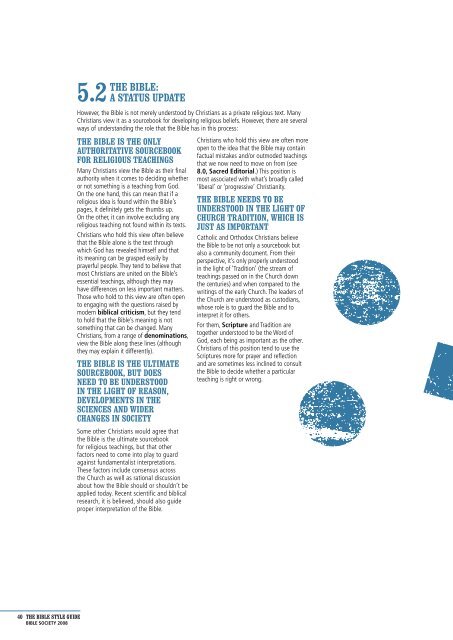BiBle STyle Guide - Get a Free Blog
BiBle STyle Guide - Get a Free Blog
BiBle STyle Guide - Get a Free Blog
Create successful ePaper yourself
Turn your PDF publications into a flip-book with our unique Google optimized e-Paper software.
40 The <strong>BiBle</strong> <strong>STyle</strong> <strong>Guide</strong><br />
bible society 2008<br />
5.2<br />
the <strong>BiBle</strong>:<br />
a statUs Update<br />
However, the Bible is not merely understood by Christians as a private religious text. Many<br />
Christians view it as a sourcebook for developing religious beliefs. However, there are several<br />
ways of understanding the role that the Bible has in this process:<br />
the <strong>BiBle</strong> is the only<br />
aUthoritative soUrceBook<br />
for religioUs teachings<br />
Many Christians view the Bible as their final<br />
authority when it comes to deciding whether<br />
or not something is a teaching from God.<br />
On the one hand, this can mean that if a<br />
religious idea is found within the Bible’s<br />
pages, it definitely gets the thumbs up.<br />
On the other, it can involve excluding any<br />
religious teaching not found within its texts.<br />
Christians who hold this view often believe<br />
that the Bible alone is the text through<br />
which God has revealed himself and that<br />
its meaning can be grasped easily by<br />
prayerful people. They tend to believe that<br />
most Christians are united on the Bible’s<br />
essential teachings, although they may<br />
have differences on less important matters.<br />
Those who hold to this view are often open<br />
to engaging with the questions raised by<br />
modern biblical criticism, but they tend<br />
to hold that the Bible’s meaning is not<br />
something that can be changed. Many<br />
Christians, from a range of denominations,<br />
view the Bible along these lines (although<br />
they may explain it differently).<br />
the <strong>BiBle</strong> is the Ultimate<br />
soUrceBook, BUt does<br />
need to Be Understood<br />
in the light of reason,<br />
developments in the<br />
sciences and wider<br />
changes in society<br />
Some other Christians would agree that<br />
the Bible is the ultimate sourcebook<br />
for religious teachings, but that other<br />
factors need to come into play to guard<br />
against fundamentalist interpretations.<br />
These factors include consensus across<br />
the Church as well as rational discussion<br />
about how the Bible should or shouldn’t be<br />
applied today. Recent scientific and biblical<br />
research, it is believed, should also guide<br />
proper interpretation of the Bible.<br />
Christians who hold this view are often more<br />
open to the idea that the Bible may contain<br />
factual mistakes and/or outmoded teachings<br />
that we now need to move on from (see<br />
8.0, sacred editorial.) This position is<br />
most associated with what’s broadly called<br />
‘liberal’ or ‘progressive’ Christianity.<br />
the <strong>BiBle</strong> needs to Be<br />
Understood in the light of<br />
chUrch tradition, which is<br />
JUst as important<br />
Catholic and Orthodox Christians believe<br />
the Bible to be not only a sourcebook but<br />
also a community document. From their<br />
perspective, it’s only properly understood<br />
in the light of ‘Tradition’ (the stream of<br />
teachings passed on in the Church down<br />
the centuries) and when compared to the<br />
writings of the early Church. The leaders of<br />
the Church are understood as custodians,<br />
whose role is to guard the Bible and to<br />
interpret it for others.<br />
For them, scripture and Tradition are<br />
together understood to be the Word of<br />
God, each being as important as the other.<br />
Christians of this position tend to use the<br />
Scriptures more for prayer and reflection<br />
and are sometimes less inclined to consult<br />
the Bible to decide whether a particular<br />
teaching is right or wrong.


